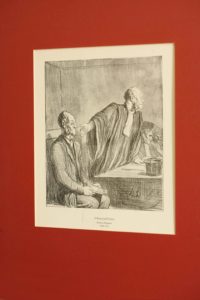Unsuitable executor
 Texas Probate Code Section 78(e) provides that a person whom the court finds unsuitable is disqualified from serving as an executor. The term "unsuitable" is not defined. The Texarkana Court of Appeals recently considered its application in In re Estate of Boren.
The decision first noted that the trial court has discretion to determine suitability. That decision will only be overturned if the trial court judge "acts in an arbitrary or unreasonable manner without reference to any guiding rules or principles." In upholding the trial court judge, the appellate court referenced the following facts from the record supporting the unsuitability of Richard Finley, the named executor:
Texas Probate Code Section 78(e) provides that a person whom the court finds unsuitable is disqualified from serving as an executor. The term "unsuitable" is not defined. The Texarkana Court of Appeals recently considered its application in In re Estate of Boren.
The decision first noted that the trial court has discretion to determine suitability. That decision will only be overturned if the trial court judge "acts in an arbitrary or unreasonable manner without reference to any guiding rules or principles." In upholding the trial court judge, the appellate court referenced the following facts from the record supporting the unsuitability of Richard Finley, the named executor:
Some of this evidence is found in the testimony of Dee; he said that Richard had told him that it was Richard's intention while attorney-in-fact for Charles and Sarah to transfer all of their property into his (Richard's) name. When Dee protested this, Richard responded that there was nothing Dee could do to prevent it. Dee testified that on another occasion, Charles had been upset because he had signed papers at Richard's request, but did not know what the documents were; as it developed, the papers were a collateral pledge of Charles's $12,000.00 certificate of deposit to guarantee a loan for Richard's daughter to purchase a house. In another incident, Dee discovered that Richard was intending to sell a tract of 127 acres to Charles for $65,000.00. Dee protested that Charles neither needed the property nor possessed the ability to even know how to locate it. Richard responded that if Charles did not buy the land, he (Richard) would lose it through foreclosure. Richard continued the personal use of the tract of land after the sale and the Borens subsequently deeded him forty acres of it as a gift.
In addition, there was testimony from Randy Boren, Charles's nephew and one-time guardian. Randy testified that Richard had confiscated Charles's tools and equipment for his own use and that while Randy was Charles's guardian, Richard had refused to provide records and receipts of his activities as attorney-in-fact for Charles, a responsibility he held. When Parks assumed the guardianship of Charles, she discovered that Richard had not paid the fees for Charles's nursing home care for some three months and that the account was some $9,000.00 in arrears. Parks also discovered that during the period commencing on January 3, 2002 through December 31, 2004, there had been automatic teller machine withdrawals from Charles's and Sarah's accounts totaling $5,271.75, despite the fact neither Charles nor Sarah knew how to use an automatic teller machine. She found further discrepancies in that Richard had written checks over that same period of time totaling $1,890.22 for fuel and "blank" checks for $38,015.21 in addition to cash withdrawals amounting to $19,115.94. Despite the fact that Charles and Sarah owned no livestock, there was $5,730.00 spent on cattle and $2,734.07 on tractor repairs, although Charles and Sarah had no tractor. The implication was that Richard had both cattle and a tractor and that he had converted these funds to his own use. Although Charles and Sarah had no outstanding notes upon which to make payments, Richard wrote checks aggregating $5,521.71 with the notation that they were for note payments.
Taking this testimony into account, there was evidence for the trial court to find Richard unsuitable to be named as executor and that Richard had breached his fiduciary duty in his use of power of attorney for Charles. The finding that Richard was unsuitable to serve as independent executor was no abuse of discretion.
